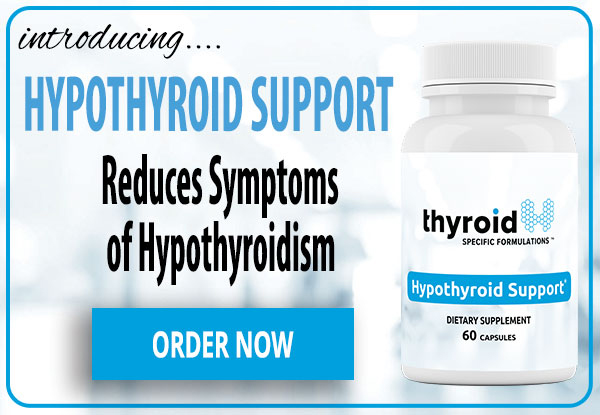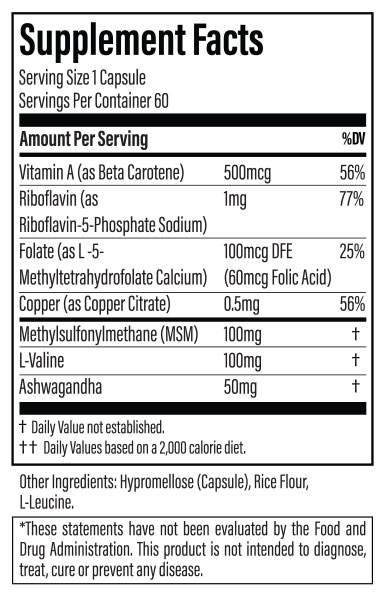- Have any questions?
- 480-631-7837
- support@in-goodhealth.com

Exercise Theory
March 17, 2023
Quitting Caffeine and What to Do Instead
March 20, 2023
Exercise Theory
March 17, 2023
Quitting Caffeine and What to Do Instead
March 20, 2023Home > Hormone Reset > Top 7 Nutrients for Hypothyroid Symptoms
Top 7 Nutrients for Hypothyroid Symptoms

Recommended Product: Hypothyroid Support is specifically designed for: Patients on thyroid medication, patients not on thyroid medication, hypothyroid patients with or without thyroid antibodies, and helpful for those who no longer have a thyroid. Click Here
Hypothyroid Nutrients: The Quick Summary
Hypothyroidism causes some apparent symptoms like:
- Weight gain
- Fatigue
- Hair loss
But it can also cause or worsen just about any symptom you can imagine. Most people with hypothyroidism find that conventional treatments don’t help them feel better.
People often know that proper thyroid nutrition can make a big difference, but it is not always clear which vitamins to take for hypothyroidism.
This article will explain how the best vitamins for hypothyroidism can reduce symptoms, help the thyroid make hormones better, and lower the chance of thyroid disease getting worse.
For a quick summary, the best vitamins for hypothyroidism are:
- Valine
- Vitamin A
- Withania
- Methylsulfonylmethane
- Riboflavin
- Folate
- Copper
These seven nutrients are made to be used with a thyroid-specific multivitamin. A good multi can provide essential cofactors like selenium, zinc, and molybdenum. But to be safe for those with thyroid disease it has to be free of iodine, folic acid, and synthetic B6.
Key Insight: The premier multivitamin made for those with thyroid disease is Thyroid Daily, and the accessory hypothyroid nutrients are combined in Hypothyroid Support, both by Thyroid Specific Formulations.
How Vitamins Help Hypothyroidism
Benefits:
- Reduces symptoms of hypothyroidism
- Improves thyroid hormone production
- Lowers the risk of disease progression
Who this applies to:
- Anyone who has been diagnosed with hypothyroidism
- Hypothyroid patients taking thyroid medication
- People who no longer have a thyroid
- People with hypothyroidism who are not taking thyroid medication
- Hypothyroid patients with or without thyroid antibodies
What is Hypothyroidism?
Hypo means ‘low’, thus hypothyroidism is low thyroid function. That’s the basics of the word origins. As far as actual meaning, there are multiple ways to answer that. We can think about the Common Usage, Symptoms of Hypothyroidism, and the Formal Definition.
Common Usage
Hypothyroidism is often used in a variety of circumstances in which thyroid function is slower than ideal. Some may refer to blood markers of thyroid function, basal body temperature, achilles tendon reflex, or the presence of symptoms.
Symptoms of Hypothyroidism
Some talk about this when they have symptoms of hypothyroidism like:
- Easy weight gain
- Unexplained fatigue
- Diffuse hair loss
- Inability to lose weight
- Persistent brain fog
- Irregular stools
- Dry skin
- Brittle nails
- Irregular menstrual cycles
- Sensation of fullness in the throat
Not everyone with hypothyroidism gets all of these symptoms and things besides hypothyroidism can cause them as well. But the more of these that are present for no apparent reason, the more likely hypothyroidism is to blame.
Formal Definition
In the medical world, hypothyroidism is defined when 2 lab findings occur together: a TSH score well above 10 IU/mL AND T4 or free T4 levels below the normal range. That’s it. Symptoms don’t change it, nor do other blood levels, optimal ranges – nothing.
Please read carefully. I am not saying this is the only circumstance in which your thyroid may be affecting you. Not at all. This is just how Hypothyroidism AKA Overt Hypothyroidism is defined in the conventional medical world. This definition leaves out a lot of people, but there is one way in which it is useful, and I’ll come back to that.
How Do You Know You Have Hypothyroidism?
Most people know they have it because they were diagnosed with it.
There are other related terms doctors may use. You might hear:
- Low thyroid
- Sluggish thyroid
- Thyroid disease
- Hashimoto’s
- Underactive thyroid
- Slow metabolism
Some of these essentially mean the same thing, others mean additional things but include hypothyroidism.
Sometimes people were never given a diagnosis but were prescribed thyroid medication. Those on thyroid medication also have hypothyroidism.
Lab Findings
Many who do not have hypothyroidism by the formal definition above, still have symptoms that could improve if thyroid function changed. This pattern may be called suboptimal thyroid function or functional hypothyroidism.
We suspect it when hypothyroid symptoms are present and thyroid levels are not formally hypothyroid, but are not the same as found in people free of thyroid symptoms.
This may include:
- TSH levels in range but above 2.0 IU/mL
- Levels of T3, T4, or reverse T3 that seem unusual
Who Gets Hypothyroidism?
Women have 6-10 times the risk of men. It’s not fair, but it’s true. They’re especially prone to get it in mid to late adulthood – 30s to early 60s. It seems to come on from a combination of a genetic predisposition that gets triggered by exposure to excess iodine. Other factors may be involved, but past genetics, age, gender, and iodine, the other factors don’t appear to be as significant.
How Can it be Helped?
The first thing I’d like you to hear is that it can be helped. Symptoms can be improved, and, for most people, thyroid function can get better. I helped people as their thyroid doctor for 25 years. There were many cases where we found secondary conditions, some of which had fewer treatment options. But people got better when thyroid disease was the only problem and they stuck with things.
I want you to keep that message. You CAN get better.
Hypothyroid Support – Sale Ends Today!
Do Medications Help?
Remember when I said the Formal Definition of hypothyroidism would be useful? Now is that time.
When people have hypothyroidism by the formal definition (TSH over 10 AND low T4), medications might improve symptoms. There are other cases where they seem to help, but studies show that the benefits are the exception and they often don’t last.
All too often someone feels like the medications help for a while. They and their doctor assume that if they can just find the right dose of the right medication, everything will be fine again. Some do stumble on the ‘right’ Rx but for most it remains elusive.
Thyroid hormones can come from pills that you take or from what your body makes by itself.
TAKING hormones is not the same as MAKING hormones. Even if they are the same hormones. Much of what your body does remains a wondrous mystery. Even if two people have the same blood levels of thyroid hormones, the person who does that naturally is not the same as the one who needs a pill.
And it’s not all or nothing. If you’re on medication, the first question to ask is if you need it. Ask your prescriber if you had overt hypothyroidism when your medication was started. If not, you may not need it. Even if you did, you may be able to take less.
Nutrients Can Help
High-quality evidence has shown that seven nutrients can help patients with all stages of hypothyroidism. This can be true even when medications are not helpful. Nutrient therapy can be used in patients not taking thyroid medication or in those who are.
Documented benefits include:
- Weight loss
- Improved energy
- Lowered risk of thyroid disease progression
- Improved thyroid function
- Improved quality of life
- Prevention of related conditions like heart disease and diabetes
Nutrients for Hypothyroidism
When I formulated Hypothyroid Support, I made it from scratch. I combined my 25+ years of experience as a Naturopathic Endocrinologist with the results of a comprehensive review of published studies that took over a year.
I chose seven ingredients that were:
- Safe for people on thyroid medication
- Proven to help hypothyroidism from high-quality studies
- Had no negative environmental effects
There were several other nutrients that were helpful, but they already belonged in my multivitamin (Thyroid Daily). To add more of them in Hypothyroid Support would have led to doses that were too high to be helpful. Hypothyroid Support is meant to be taken with Thyroid Daily.
Considering those factors, I chose these seven nutrients to support hypothyroidism.
Vitamin A
How does it work?
Vitamin A and its precursor beta carotene are essential in regulating thyroid hormone metabolism. Vitamin A supplementation in humans can downregulate excessive TSH-b gene expression leading to normalized TSH output. A lowered TSH output means the thyroid can secrete hormones more efficiently.
What is the Evidence?
Researchers conducted a 4-month randomized, double-blind study with healthy adult women. The study aimed to see the effects of vitamin A supplementation on obesity and thyroid function.
Researchers gave participants a Vitamin A supplement or placebo and tracked body weight and thyroid function. Many participants had varying degrees of obesity and hypothyroidism.
Compared to those on the placebo, those taking Vitamin A saw significant reductions in hypothyroidism and decreased body weight. Specifically, TSH levels lowered, and T3 levels improved. No significant side effects were noted.2
Image1: Decrease in Fat Mass3

Table 2: Improvement in TSH and T34

Riboflavin
How Does it Work?
Low riboflavin levels can cause diseases such as anemia, cataracts, migraines, and thyroid dysfunction. Riboflavin, also known as Vitamin B2, plays a vital role in glutathione peroxidase production. People with thyroid disease have greater demands on glutathione peroxidase production, and they may be less able to convert riboflavin to active forms such as riboflavin 5 phosphatase.5
Riboflavin supplementation can reduce the proinflammatory cytokines and oxidative stress that correlate with the progression of hypothyroidism.
What is the Evidence?
A group of 387 adults, primarily women, underwent laboratory testing for thyroid health and micronutrient status. They were divided by thyroid function and micronutrient status.
Of the measured micronutrients, riboflavin had a clear association with healthy T4 status and lower rates of severe hypothyroidism.6
Folate (L-5-Methyltetrahydrofolate Calcium)
How Does it Work?
Patients with thyroid disease commonly lack Folate.7 The connection occurs because the genetics of thyroid disease correlates with gene variations of folate metabolism.8
What is the Evidence?
Hypothyroid patients treated with thyroid medication have higher risks for premature coronary artery disease than untreated peers. This risk correlates with hyperhomocysteinemia. In a study of hypothyroid women, folic acid supplementation helped lower these risks to baseline levels.9
A recent screening study showed that adults lacking folate are more likely to have higher TSH levels in a dose-related association.10
Copper
How Does it Work?
Copper is the third most abundant mineral in the human body. It plays a critical role in many facets of thyroid function, including hormone production, cellular utilization, and the protection of thyrocytes.
Copper is involved with thyroxine formation from the thyroid and the uptake of thyroid hormones in peripheral metabolism. It also is an essential component of the thyroid’s endogenous antioxidant superoxide dismutase.11
What is the Evidence?
In a group of adults, copper levels were measured along with thyroid function status. Mild copper deficiencies were associated with all types of thyroid dysfunction, including elevated TSH, low T4, and low T3. Low copper was also highly associated with thyroid nodules.12
In a group of hypothyroid adults, a 64% increase in copper correlated with a decrease in TSH scores from 42 to 3 and normalization in both T3 and T4.

Methylsulfonylmethane (MSM)
How Does it Work?
T3 and T4 are converted into sulfated forms in the liver and the intestinal tract. Up to 20% of the thyroid hormone in the body resides in sulfated storage.13 These sulfated forms are temporarily inactive but can be drawn on to offset hypothyroidism.14
The ability to sulfate thyroid hormones is conditional upon bioavailable sulfur compounds. Methylsulfonylmethane (MSM) is an ideal source of sulfur due to its excellent safety and absorption. In addition to the sulfation of thyroid hormones, MSM has been clinically proven to benefit complications associated with hypothyroidism, including chronic pain, inflammation, and oxidative stress.15
L-Valine
Valine is an essential amino acid and one of the branched-chain amino acids. It is considered the single most rate-limiting amino acid for the retention of lean body mass and muscle protein synthesis.16
What is the Evidence?
A group of patients undergoing thyroidectomy was monitored for the effects of hypothyroidism on health and amino acid status. Adverse changes in branched-chain amino acids correlated strongly with hypothyroidism and the associated weight gain.17
In a separate trial, adults with varying thyroid function levels were evaluated for micronutrient status. Higher Valine status was associated with improved T4 levels and free T4.18
Withania Somnifera (Ashwagandha)
Ashwagandha has been clinically proven to improve hypothyroid symptoms such as low energy output and impaired basal metabolic rate.19 Studies have shown that it can be instrumental in normalizing one of the causal factors of thyroid disease, impaired pituitary hypothalamic axis (HPA).20,21
What is the Evidence?
In a clinical trial, ninety adults with subclinical hypothyroidism were identified by researchers and treated with Ashwagandha. Compared to the placebo group, those taking Ashwagandha showed significant improvements in all markers of hypothyroidism, including TSH, T4, and T3.22

Supportive Strategies for Hypothyroidism
Hypothyroid Support is best used as part of a comprehensive protocol aimed at improving thyroid hormone production and utilization.
Helpful additional measures include:
- Thyroid Specific Multivitamin – Thyroid Daily
- Management of thyroid antibodies – Antibody Support
- Iodine regulation per The Thyroid Reset Diet
- Correction of abnormalities of cortisol slope
Hypothyroid Support Dosage
1 capsule once daily with food or as recommended by your health care professional.
Key Insight: To use Hypothyroid Support, just take 1 pill daily in the morning. Use at least 1 hour after thyroid medication.
Supplement Facts

Does Not Contain
Hypothyroid Support does not contain Iodine, gluten, corn, yeast, soy, GMOs, dairy products, artificial colors, artificial flavors, or preservatives.
Summary
Hypothyroidism symptoms can greatly improve with proper thyroid nutrition. The natural world contains everything we need to heal our bodies, and the thyroid is no exception.
For those struggling with hypothyroidism, Hypothyroid Support has the seven nutrients that can lower symptoms, help the thyroid work better, and prevent other types of autoimmune disease.
1 – Bekkering GE, Agoritsas T, Lytvyn L, et al. Thyroid hormones treatment for subclinical hypothyroidism: a clinical practice guideline. BMJ. 2019;365:l2006. Published 2019 May 14. doi:10.1136/bmj.l2006
2 – Farhangi, M. A., Keshavarz, S. A., Eshraghian, M., Ostadrahimi, A., & Saboor-Yaraghi, A. A. (2012). The Effect of Vitamin A Supplementation on Thyroid Function in Premenopausal Women. Journal of the American College of Nutrition, 31(4), 268–274. doi:10.1080/07315724.2012.1072
3 – Farhangi, M. A., Keshavarz, S. A., Eshraghian, M., Ostadrahimi, A., & Saboor-Yaraghi, A. A. (2012). The Effect of Vitamin A Supplementation on Thyroid Function in Premenopausal Women. Journal of the American College of Nutrition, 31(4), 268–274. doi:10.1080/07315724.2012.1072
4 – Farhangi, M. A., Keshavarz, S. A., Eshraghian, M., Ostadrahimi, A., & Saboor-Yaraghi, A. A. (2012). The Effect of Vitamin A Supplementation on Thyroid Function in Premenopausal Women. Journal of the American College of Nutrition, 31(4), 268–274. doi:10.1080/07315724.2012.1072
5 – Mahabadi N, Bhusal A, Banks SW. Riboflavin Deficiency. In: StatPearls. Treasure Island (FL): StatPearls Publishing; July 18, 2022.
6 – Krishnamurthy HK, Reddy S, Jayaraman V, et al. Effect of Micronutrients on Thyroid Parameters. J Thyroid Res. 2021;2021:1865483. Published 2021 Sep 28. doi:10.1155/2021/1865483
7 – Lippi G, Montagnana M, Targher G, Salvagno GL, Guidi GC. Prevalence of folic Acid and vitamin B12 deficiencies in patients with thyroid disorders. Am J Med Sci. 2008;336(1):50-52. doi:10.1097/MAJ.0b013e31815c3b5b
8 – Yang R, Pu D, Tan R, Wu J. Association of methylenetetrahydrofolate reductase (MTHFR) gene polymorphisms (C677T and A1298C) with thyroid dysfunction: A meta-analysis and trial sequential analysis. Arch Endocrinol Metab. 2022;66(4):551-581. doi:10.20945/2359-3997000000471
9 – Orzechowska-Pawilojc A, Siekierska-Hellmann M, Syrenicz A, Sworczak K. Homocysteine, folate, and cobalamin levels in hyperthyroid women before and after treatment. Endokrynol Pol. 2009;60(6):443-448.
10 – Krishnamurthy HK, Reddy S, Jayaraman V, et al. Effect of Micronutrients on Thyroid Parameters. J Thyroid Res. 2021;2021:1865483. Published 2021 Sep 28. doi:10.1155/2021/1865483
11 – Arora, M., Mahat, R. K., Kumar, S., Mustafa, I., & Sah, S. P. (2018). Study of Trace Elements in Patients of Hypothyroidism with Special Reference to Zinc and Copper. Biomedical Journal of Scientific & Technical Research (2), 001–005. https://doi.org/10.26717/BJSTR.2018.06.001336
12 – Kim MJ, Kim SC, Chung S, Kim S, Yoon JW, Park YJ. Exploring the role of copper and selenium in the maintenance of normal thyroid function among healthy Koreans [published online ahead of print, 2020 May 24]. J Trace Elem Med Biol. 2020;61:126558. doi:10.1016/j.jtemb.2020.126558
13 – Köhrle J. Thyroid Hormones and Derivatives: Endogenous Thyroid Hormones and Their Targets. Methods Mol Biol. 2018;1801:85-104. doi:10.1007/978-1-4939-7902-8_9
14 – Visser TJ. Role of sulfation in thyroid hormone metabolism. Chem Biol Interact. 1994;92(1-3):293-303. doi:10.1016/0009-2797(94)90071-x
15 – Butawan M, Benjamin RL, Bloomer RJ. Methylsulfonylmethane: Applications and Safety of a Novel Dietary Supplement. Nutrients. 2017;9(3):290. Published 2017 Mar 16. doi:10.3390/nu9030290
16 – Bohé J, Low A, Wolfe RR, Rennie MJ. Human muscle protein synthesis is modulated by extracellular, not intramuscular amino acid availability: a dose-response study. J Physiol. 2003;552(Pt 1):315-324. doi:10.1113/jphysiol.2003.050674
17 – van der Boom T, Gruppen EG, Lefrandt JD, Connelly MA, Links TP, Dullaart RPF. Plasma branched chain amino acids are lower in short-term profound hypothyroidism and increase in response to thyroid hormone supplementation. Scand J Clin Lab Invest. 2020;80(7):562-566. doi:10.1080/00365513.2020.1804610
18 – Krishnamurthy HK, Reddy S, Jayaraman V, et al. Effect of Micronutrients on Thyroid Parameters. J Thyroid Res. 2021;2021:1865483. Published 2021 Sep 28. doi:10.1155/2021/1865483
19 – Singh N, Bhalla M, de Jager P, Gilca M. An overview on ashwagandha: a Rasayana (rejuvenator) of Ayurveda. Afr J Tradit Complement Altern Med. 2011;8(5 Suppl):208-213. doi:10.4314/ajtcam.v8i5S.9
20 – Lopresti AL, Smith SJ, Drummond PD. Modulation of the hypothalamic-pituitary-adrenal (HPA) axis by plants and phytonutrients: a systematic review of human trials. Nutr Neurosci. 2022;25(8):1704-1730. doi:10.1080/1028415X.2021.1892253
21 – Mariotti S, Beck-Peccoz P. Physiology of the Hypothalamic-Pituitary-Thyroid Axis. [Updated 2021 Apr 20]. In: Feingold KR, Anawalt B, Boyce A, et al., editors. Endotext [Internet]. South Dartmouth (MA): MDText.com, Inc.; 2000-. Available from: https://www.ncbi.nlm.nih.gov/books/NBK278958/
22 – Sharma AK, Basu I, Singh S. Efficacy and Safety of Ashwagandha Root Extract in Subclinical Hypothyroid Patients: A Double-Blind, Randomized Placebo-Controlled Trial. J Altern Complement Med. 2018;24(3):243-248. doi:10.1089/acm.2017.0183

P.S. Whenever you are ready, here is how I can help you now:
- Schedule a Thyroid Second Opinion with me, Dr. C, Click Here for Details
- Need help to choose supplements? Click ‘Help Me Decide Here'
- Get my top books Here
Dr. Alan Glen Christianson (Dr. C) is a Naturopathic Endocrinologist and the author of The NY Times bestselling Hormone Healing Cookbook, The Metabolism Reset Diet, and The Thyroid Reset Diet.
Dr. C’s gift for figuring out what works has helped hundreds of thousands reverse thyroid disease, heal their adrenals, and lose weight naturally. Learn more about the surprising story that started his quest.






